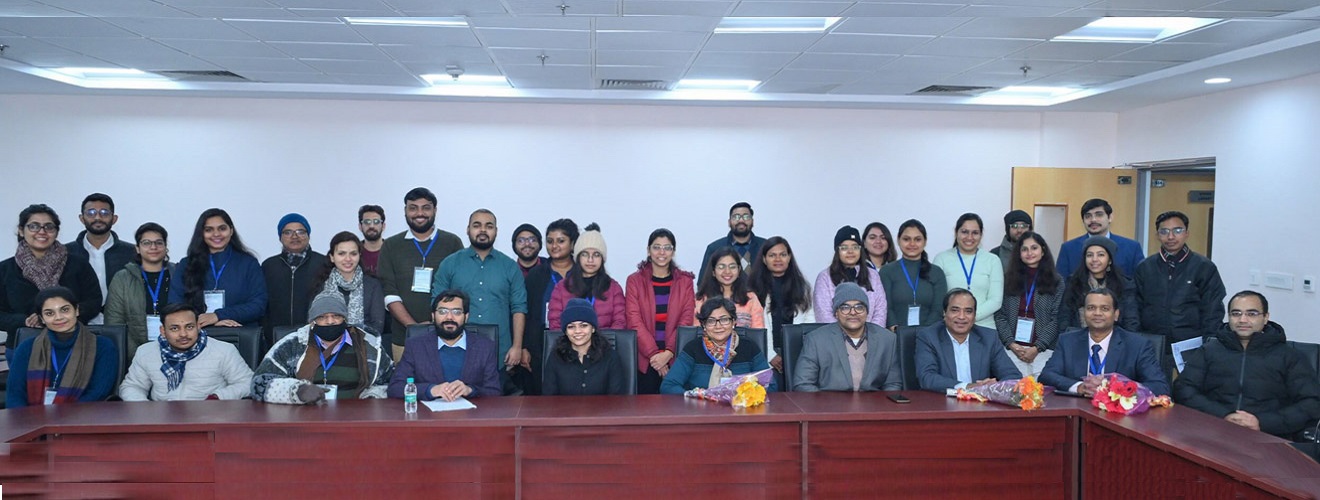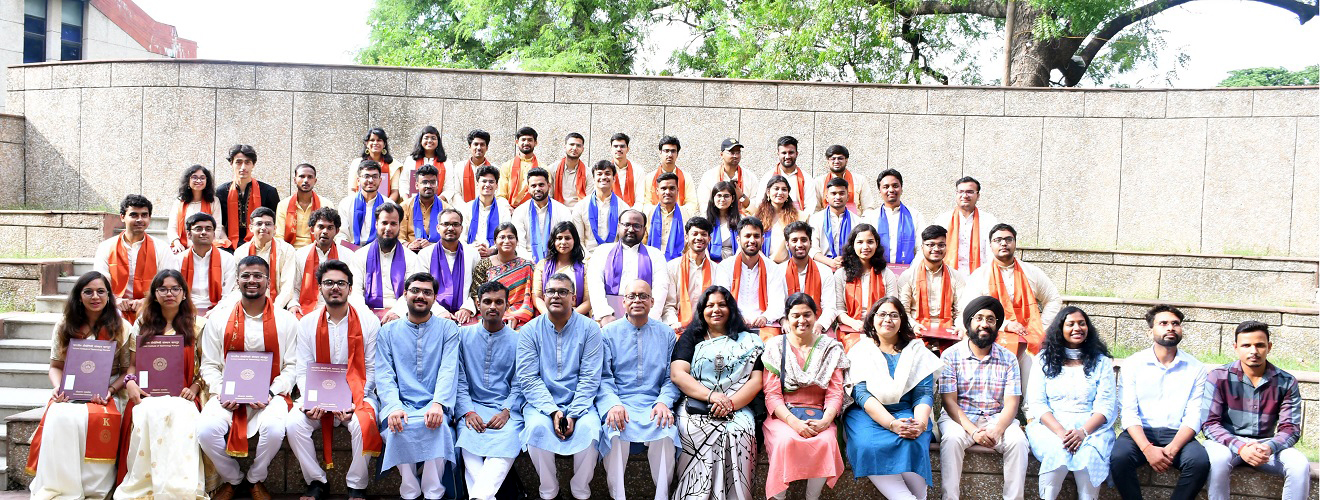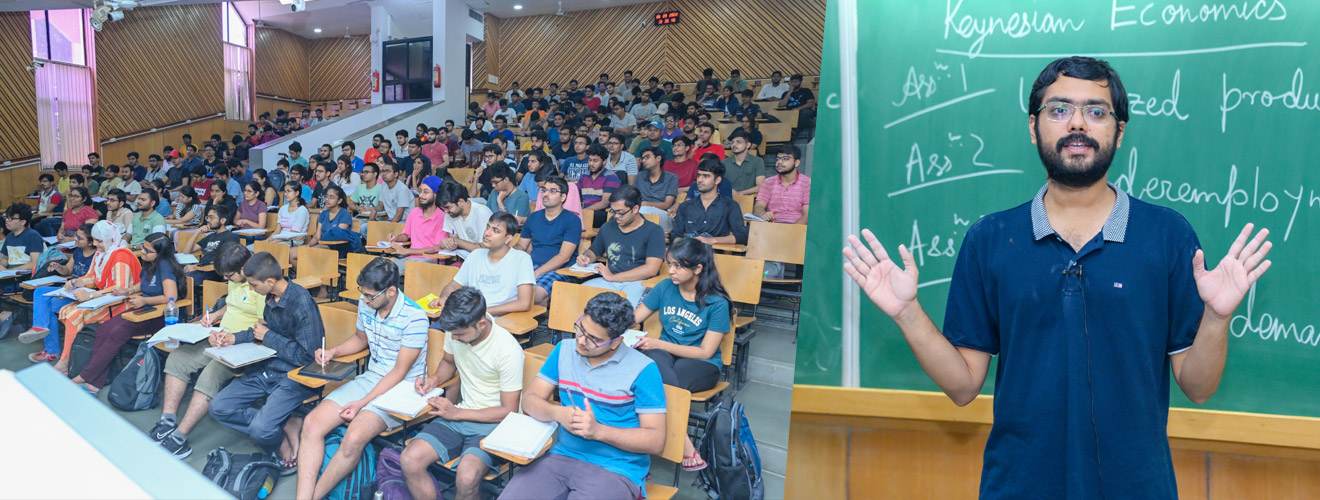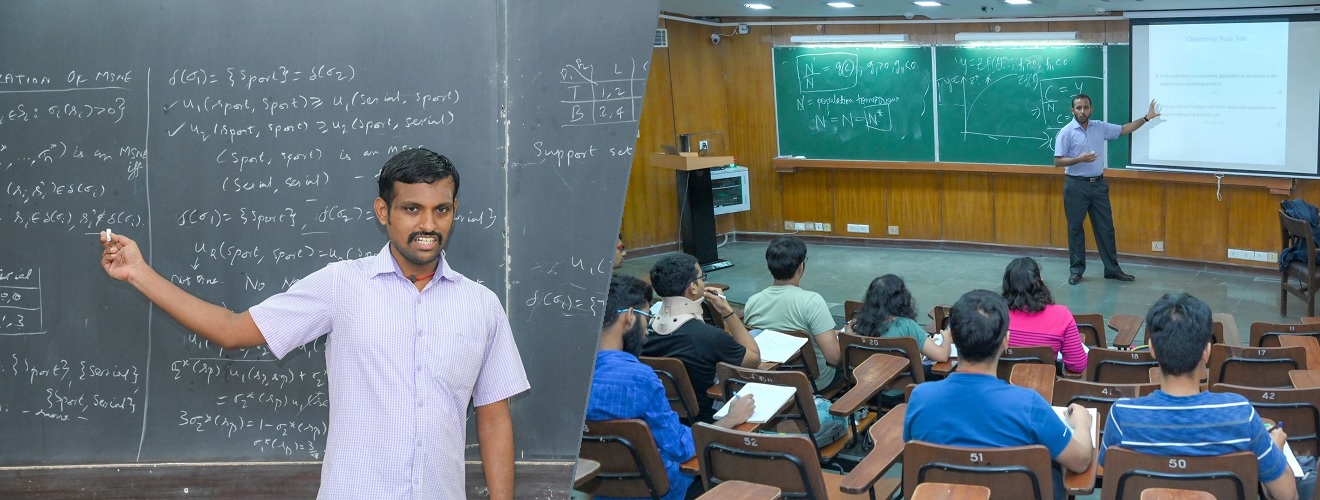About Us
The Department of Economic Sciences has 26 permanent faculty members with research and teaching interests that cover a broad range of fields. Apart from having strength in traditional areas like microeconomics, macroeconomics, and econometrics; the department has expertise in agricultural economics, Bayesian econometrics, behavioral economics, development economics, efficiency, and productivity analysis, environmental economics, financial economics, health economics, industrial economics, international trade, labor economics, law and economics, optimization theory, political economy, family economics, and public policy.
The department primarily offers four degrees in economics: 4 years B.S., 1 year M.S., 2 year M.Sc., and Ph.D. in Economics. Admission for the 52 seats (per year) in the B.S. program is through the advanced joint entrance examination (JEE). B.S. students who satisfy certain eligibility criteria can opt for a 1 year M.S. program in Economics. There is also a provision for the dual degree for undergraduate students of IITK. Admission to the M.Sc. program is through JAM/GATE and a written test conducted by IIT Kanpur. Entry to the Ph.D. program is through a written test and a viva exam conducted once at the beginning of each academic year. The department also offers several e-Masters programs.
- Research Scholars Day Conference, March 2025: Call for Papers New
- Detailed program of the 2024-25 Public Policy Conference can be found here
- Result for MSc 2yr 2024 entrance exam held on 7th June 2024
- List of Selected candidates for PhD Program 2024-25
- The Question paper and Answer key for the 2024-25 exam.
- Addendum to the List of Shortlisted Candidates for MSc Round 2 Written Test
- List of Shortlisted Candidates for MSc Round 2 Written Test
- List of Shortlisted Candidates for PhD
- Public Policy Conference, August 2024: Call for Papers
- Follow @iitk_econ on Twitter for latest updates
- The 2024 Research Scholars' Day was held on 23rd-24th January
- Arthashashtra-2023
- Recent PhD Placements
Title: Global Univalence and Factor price equalization via the class of P Matrices
Speaker: Prof. T E S Raghavan, Emeritus Professor at the University of Illinois at Chicago, USA
Date: January 27, 2025, 11.00 AM to 12.00 PM; Venue: ESB-2/435
Title: Differential Regulation and Firm Responses: A Study of the CAFE Standard
Speaker: Dr. Nafisa Lohawala, a fellow at Resources for the Future, USA
Date: November 29th, 3.00 PM to 4.00 PM; Venue: ESB-2/435
Title: Three Score and 15 Years (1948-2023) of Rao’s Score Test: A Brief History
Speaker: Prof. Anil Bera from Professor of Economics, College of LAS, University of Illinois, USA
Date: October 25th, 3.30 PM to 4.30 PM; Venue: ESB-2/435
Title: The relevant third: threat of coalition and economic development
Speaker: Dr. Somdeep Chatterjee from IIM Calcutta
Date: October 18th, 3.00 PM to 4.00 PM; Venue: ESB-2/435
Title: Teacher Quality in Delhi's High Schools
Speaker: Dr. Deepti Goel from Pitzer College in Claremont, USA
Date: September 27th, 4.30 PM to 5.30 PM; Venue: Virtual
Title: A Discussion on the June 2024 Financial Stability Report
Speaker: Shri Rakesh Kumar (DGM), Shri Prem Mohan (AGM), and Shri Aniket Singh (Manager), from the Reserve Bank of India
Date: September 13th, 11:00 am; Venue: ESB-2/435
Title: Uses of Machine Learning in Applied Economics
Speaker: Lucie Maruejols from Institute of Agricultural Economics, the Christian-Albrechts-University of Kiel, Germany
Date: August 23rd, 3:30 pm; Venue: ESB-2/435
Public policy Lecture
Title: Diversity of India and Its Relevance in Framing the Public Policy
Speaker: Bhagwan Shankar, IAS (retired)
Date: August 20th, 12:00 pm; Venue: ESB-2/435
Title: Local Media Reports about Sexual Crimes and Judicial Outcomes in India
Speaker: Mahima Vasishth from Bocconi University
Date: August 9th, 3:30 pm; Venue: ESB-2/435
Title: Optimum Design of Automated Market Makers
Speaker: Prof. Ashish Goel from Stanford University, USA
Date: August 1st, 3:30 pm; Venue: KD 101
Title: Do individuals follow recommendations?
Speaker: Prof. Indrajit Ray from Cardiff University, UK
Date: July 19th, 11:00 am; Venue: ESB-2/435
Title: Economic and Financial Performance of Indian IT Services Export Firms.
Speaker: Prof. P.M.Rao from Long Island University, New York
Date: July 2nd, 12:00 noon; Venue: ESB-2/435
Title: Computable comparative statics of equilibrium in partially ordered models.
Speaker: Tarun Sabarwal from University of Kansas, USA
Date: May 31st, 11:00 am; Venue: ESB-2/435
Title: A theory of international alliances
Speaker: Raghul S. Venkatesh, IISER, Bhopal
Date: April 18th, 3:00 pm; Venue: LH-08
Title: Welfare effects of catastrophic climate events on mountain communities: a case study of the Uttarakhand flash floods
Speaker: Meeta K. Mehra, JNU
Date: April 8th, 12:00 pm; Venue: LH-03
Title: Stable matching with privately observed payments
Speaker: Arunava Sen, ISI, Delhi
Date: April 4th, 3:00 pm; Venue: LH-08
Title: Reserve price competition with demand uncertainty
Speaker: Jeevant Rampal, IIM Ahmedabad
Date: March 21st; Venue: ESB-2/435
Title: Nudging marriage norms through cash transfers
Speaker: Rohini Somanathan, DSE, University of Delhi
Date: March 18th; Venue: ESB-2/435
Public policy Lecture
Title: Insurance sector's role in the Indian economy
Speaker: Abhay Tewari, Managing Director and CEO of Star Union Dai-ichi Life Insurance
Date: March 14th, 12:00 pm; Venue: ESB-2/435
Title: Dynamics of firm growth around policy thresholds: evidence from India
Speaker: Bhanu Gupta, Ashoka University
Date: March 4th, 11:00 am; Venue: ESB-2/435
Public policy Lecture
Title: Public policy in India: concepts and experiences
Speaker: Mr. Kumar Alok, IAS (retired)
Date: March 1st, 12:00 pm; Venue: ESB-2/435
Colloquium Talk Series
Title: Measuring political power at the state level and domination power at individual family level via the Shapley value and the nucleolus
Speaker: T.E.S. Raghavan, University of Illinois Chicago.
Date: February 27th,4:00 pm - 5:00 pm; Venue: LH8
Title: Final offer arbitration
Speaker: T.E.S. Raghavan, University of Illinois, Chicago
Date: February 26th, 11:00 am; Venue: ESB-2/435
Title: Bargaining and cooperation in dynamic games
Speaker: Dilip Abreu, New York University
Date: January 17th, 3:00 pm; Venue: ESB-2/435
Title: General Equilibrium Impact of Japan Joining APTA and APTA without India: A Structural Gravity Analysis
Speaker: Somesh K. Mathur, IIT Kanpur
Date: October 9th, 3:30 pm; Venue: ESB-2/435
Title: Sequential learning in a stochastic multi-armed bandit framework
Speaker: Sandeep Juneja, Tata Institute of Fundamental Research and Google Research
Date: October 5th, 3:30 pm; Venue: Room 435, ESB-2
Public Policy Seminar
Title: TBD
Speaker: Ashutosh Sharma, IIT Kanpur
Date: September 25th, 4pm; Venue: Room 435, ESB-2
Title: Impact of loans on forced labor outcomes
Speaker: Anisha Sharma, Ashoka University
Date: Sept 14th, 3:30 pm; Venue: Room 435, ESB-2
Title: Strengthening prediction models for default risk of unlisted firms
Speaker: Sourish Das, Chennai Mathematical Institute
Date: Sept 4th, 3:30 pm; Venue: Room 435, ESB-2
Title: Trade, Infrastructure and Institutions: Theory and Evidence on Export Quality
Speaker: Saibal Kar, Centre for Studies in Social Sciences, Calcutta
Date: August 24th, 3:30 pm; Venue: Room 435, ESB-2
Title: Optimal intermediary test-and-disclosure-design
Speaker: Ayush Pant, Ashoka University
Date: August 10th, 3:30 pm; Venue: Room 435, ESB-2
Title: The Effect of Syndication on Performance Manipulation in the Venture Capital Industry
Speaker: Shrijata Chattopadhyay, Purdue University
Date: July 4th, 11:30 am; Venue: FB620
Title: The Long-Term Effect of British Colonialism on Women Empowerment in India
Speaker: Punarjit Roychowdhury, Shiv Nadar Uni.
Date: April 17th, 5:30 pm; Venue: Virtual
Title: Cooking up empowerment: Does empowerment influence choice of
household cooking fuel?
Speaker: Zakir Husain, Presidency Uni.
Date: April 13th, 12 noon; Venue: FB620
Title: Conflict with Third-Party Intervention and Revenge: A Game-Theoretic Exploration
Speaker: Soumyanetra Munshi, ISICAL
Date: April 6th, 3pm; Venue: L-12
Title: Feedback Effects and Systematic Risk Exposures
Speaker: Snehal Banerjee, Rady School of Management, University of California, San Diego
Date: February 24th, 9am; Venue: Virtual
Title: Duality Between Multi-Output Production Correspondences and Cost Functions
Speaker: Juan Enrique Martinez-Legaz, Universitat Autònoma de Barcelona
Date: February 6th, 4pm; Venue: TBD
Title: Monetary Incentives and Journal Publications: Evidence from a
Natural Experiment (Joint work with Debashish Bhattacherjee, IIM Calcutta)
Speaker: Prof. Tanika Chakraborty, IIM Calcutta
Date: Monday November 14th, 2022; From 3:30 pm
Venue: L-13 and Virtual
Title: Household preferences for home food consumption under food and cash
constraints, and market imperfections: an inverse-U relationship with income
Speaker: Dr. Lucie Maruejols, University of Gottingen
Date: Monday October 31st, 2022; From 3:30 pm
Venue: L-13 and virtual
Title: Granular Origin of Comovement in Fluctuations
Speaker: Prof. Anindya S. Chakrabarty, Indian Institute of Management Ahmedabad.
Date: Monday October 17th, 2022; From 3:30 pm
Venue: L-13 and Virtual
Title: Demand Side Story: Structural Change and the Decline in Female Labour Force Participation in India
Speaker: Prof. Ashwini Deshpande, Ashoka University.
Date: Thursday October 13th, 2022; From 3:30 pm
Venue: L-13 and Virtual
Title: Does facetime with the boss matter? Soft information communication and organizational performance
Speaker: Dr. Kaushalendra Kishore, CAFRAL
Date: Monday October 10th, 2022; From 3:30 pm
Venue: L-13 and Virtual
Title: A JOURNEY IN SEARCH OF THE UNKNOWN "TRUE" MODEL: Data-Based
Nonparametric Econometrics and Empirical Economics
Speaker: Prof. Aman Ullah, Univ. of California - Riverside
Date: Monday September 26th, 2022; From 7:30 pm
Venue: Virtual
Title: Stable dissolution of a partnership
Speaker: Prof. Debasis Misra, ISI Delhi
Date: Friday September 16th, 2022; From 3:30 pm
Venue: FB-620
Title: Convergence Across Castes
Speaker: Prof. Amartya Lahiri, University of British Columbia.
Date: Wednesday September 14th, 2022; From 5:30 pm
Venue: FB-620
Title: Does the choice of words in the Fed’s Board of Governors’ speeches matter?
Speaker: Prof. Abhinav Anand, IIM Bangalore
Date: Monday September 12th, 2022; From 3:30 pm
Venue: L-13 and Virtual
Title: Culture and Market : A Macroeconomic Tale of Two Institutions
Speaker: Prof. Mausumi Das, Delhi School of Economics
Date: Monday September 5th, 2022; From 3:30 pm
Venue: L-13 and Virtual
Title: Growth Miracles and Consumer Bankruptcy Policy
Speaker: Prof. Urvi Neelakantan
Date: Monday August 29th, 2022; From 6 pm
Venue: Virtual
Title: Automation, Displacement and Democracy
Speaker: Prof. Jaideep Roy, University of Bath
Date: August 08, Monday, 2022; From 3:30 pm
Venue: L-13 and Virtual
Title: Threshold Regression Model with Panel Data - Some Issues
Speaker: Prof. Panchanan Das, University of Calcutta
Date: August 02, Tuesday, 2022; From 3:30 pm
Venue: Room 620, Faculty Building
Title: Rank-preserving Multidimensional Mechanisms
Speaker: Prof. Sushil Bikhchandani, UCLA Anderson School of Management
Date: August 01, Monday, 2022; From 10 am
Virtual Meeting
Title: Characterization results in sequencing with welfare lower bounds: an incentive and an egalitarian approach
Speaker: Dr. Sreoshi Banerjee
Date: July 29, Friday, 2022; From 3:30 pm
Venue: Room 620, Faculty Building
Title: Sectoral Productivity Impacts of Trade Liberalization, Huuman capital formation and industrial policy with macroeconomic dynamics: An expost partial and ex ante general equilibrium analysis
Speaker: Prof. S.K. Mathur, session at the ISID (Institute for Studies in Industrial Development, Delhi) Capacity Building Programme
Date: February 25th, 2022
Title: Impact of Public Procurement on Private Sector: Evidence from Indian Pharmaceutical Industry
Speaker: Prof. Samarth Gupta, National Council of Applied Economic Research (NCAER)
Date: February 8th, 2022; from 6:00 PM to 7:00 PM Venue: Virtual meeting
Title: Why Does Consumption Fluctuate in Old Age and How Should the Government Insure It?
Speaker: Prof. Jeanne Commault , Sciences Po
Date: October 6th, 2021; Venue: Virtual meeting
Title: Till Dowry Do Us Part: Bargaining and Violence in Indian Families
Speaker: Prof. Rossella Calvi, Rice University
Date: September 21st, 2021; Venue: Virtual Meeting
Title: Can Pesion Reforms Solve the “Missing Women” Problem?
Speaker: Prof. Avraham Ebenstein, Hebrew University of Jerusalem
Date: September 6th, 2021; Venue: Virtual Meeting
Title: Why do people stay poor?
Speaker: Prof. Maitreesh Ghatak, London School of Economics
Date: February 19th, 2021; Venue: Virtual Meeting
- Prabheesh, K. P., Wickramarachchi, V., & Kumar, Sanjiv. (2024). Assessing the Impact of US Monetary Policy on Foreign Currency Debt and Credit Growth in Emerging Markets During the COVID-19 Pandemic”. Emerging Markets Finance and Trade, 1-17. https://www.tandfonline.com/doi/abs/10.1080
- Saini, S., Ahmad, W., & Salahuddin. (2024). Do recessions induce the Schumpeterian creative destruction? Micro-evidence from India. Emerging Markets Review, In Press.
- Kaur, M., Ahmad, W., Hari, K. S., & Kattumuri, R. (2024). FinTech entrepreneurial ecosystem in India: Role of incubators and accelerators. Global Finance Journal, In Press.
- Vikram, A. Worst-case efficient and budget-balanced mechanism for single-object allocation with interdependent values. Social Choice and Welfare 62, 89–108 (2024).
- Batham, M., Ojha, M., Mirghasemi, S., and Rahman, M. A. (2023), “Binary and Ordinal Probit Regression: Applications to Public Opinion on Marijuana Legalization in the United States,” Applied Econometric Analysis using Cross Section and Panel Data, edited by Deep Mukherjee, 33-60, 2023. Contribution to Economics, Springer Singapore, Singapore.
- Singh, A., & Vellakkal, S. (2023). Outreach of the programmatic components of National Health Mission in India: An inter- and intra-state analysis using nationally representative data. Journal of Public Affairs (Wiley), e2883 (early view ahead of print). https://doi.org/10.1002/pa.2883
- Archana Srivastava, Somesh K Mathur and Prabir De (2023),” Ex-Ante Evaluation of Indias Trade Alliance with Indo Pacific: A General Equilibrium Analysis”,volume 58, issue 2, Foreign Trade Review, Sage Publication
- T Argaw, J Fledderjohann, E Aurino, S Vellakkal (2023). Children’s Educational Outcomes and Persistence and Severity of Household Food Insecurity in India: Longitudinal Evidence from Young Lives. The Journal of Nutrition (Elsevier).Vol 153 (4), April 2023, Pages 1101-1110.
- Maheshwari, P. and Rahman, M. A.(2023), "bqror: An R Package for Bayesian Quantile Regression in Ordinal Models", The R Journal, 1-17 (forthcoming)
- Archana Srivastava, Somesh K Mathur and Prabir De (2023),"An Ex Ante Evaluation of Indo-Pacific Economic Framework A General Equilibrium Analysis", Economic & Political Weekly JANUARY 28, 2023 vol LVIII no 4
- Vellakkal S,Khan Z, Alavani H, J Fledderjohann, Stuckler D: Effects of public policies in preventing cardiovascular diseases, Public Health (Elsevier). Volume 207, June 2022, Pages 73-81.
- Revisiting the nexus between fiscal decentralization and government size - The role of ethnic fragmentation. Atrayee Choudury and Sohini Sahu, European Journal of Political Economy, Volume 75, December 2022, 102193.
- Cross-country variations in economic complexity: The role of individualism. Garima Maurya and Sohini Sahu, Economic Modelling, Volume 115, October 2022, 105961.
- Fiscal decentralization, regional disparity, and the role of corruption. Nupur Nirola, Sohini Sahu and Atrayee Choudhury, The Annals of Regional Science, Volume 68, 2022
- Archana Srivastava and Somesh K Mathur(2022), "India's Possible Alignment with the RCEP: A General Equilibrium Analysis of Impacts on Carbon Emissions", forthcoming as book chapter in the book entitled" Thirty Years of ASEAN", AIC, RIS, Ministry of External Affairs, Delhi and Cambodia
- Archana Srivastava, Rachna Mathur and Somesh K Mathur (2022),"Evaluation of ASEAN–India Free Trade Regime: A General Equilibrium Approach", Journal of Asian Economic Integration, Volume 4, Number 2, Sage Publication, Thailand, New Delhi
- Chopra, A., M., Lahiri. A, (2022), "Pandemics through the lens of occupations", Canadian Journal of Economics
- Vikram A.,"A top-only mechanism with reserve price for single-good allocation problem." Economics Letters (2022): 110646.
- Dar, S. S., & Sahu, S. (2022). The effect of language on financial inclusion. Economic Modelling, 105693.
- Dutta, J., & Martínez-Legaz, J. E. (2021). Error bounds for inequality systems defining convex sets. Mathematical Programming, 189(1), 299-314.
- A Kanya, T Marthias, S Vellakkal, N Carvalho, R Atun, A Morgan, Y Zhao, E Hulse, B McPake, J Lee (2021). Socioeconomic inequalities ineffective service coverage for reproductive, maternal, newborn, and child health: a comparative analysis of 39 low-income and middle-income countries, EClinicalMedicine-LANCET, Volume 40
- Singh, A., & Vellakkal, S.(2021). "Impact of public health programs on maternal and child health services and health outcomes in India: A systematic review". Social Science & Medicine, 113795.
- Saini, S., Ahmad, W.,& Bekiros, S. (2021). "Understanding the credit cycle and business cycle dynamics in India". International Review of Economics & Finance, 76, 988-1006.
- Khan, M. A., & Ahmad, W.(2021). "Fresh Evidence on the Relationship between Market Power and Default Risk of Indian Banks". Finance Research Letters (Forthcoming).
- Dempe, S., Dinh, N., Dutta, J., & Pandit, T. (2021). "Simple bilevel programming and extensions". Mathematical Programming,188(1), 227-253.
| Course No. | Course Title |
|---|---|
| INTRODUCTION TO ECONOMICS | ECO101A |
| INTRODUCTON TO MACROECONOMIC PROBLEMS AND POLICIES | ECO112A |
| MICROECONOMICS I | ECO201A |
| MACROECONOMICS I | ECO221A |
| INTRODUCTION TO MATHEMATICAL ECONOMICS | ECO261A |
| MICROECONOMICS II | ECO301A |
| DEVELOPMENT ECONOMICS | ECO311A |
| MACROECONOMICS-II | ECO321A |
| ECONOMETRICS I | ECO341A |
| ECONOMETRICS II | ECO342A |
| PUBLIC ECONOMICS AND PUBLIC POLICY | ECO371A |
| TECHNICAL COMMUNICATION | ECO397A |
| UG PROJECT (UGP-I) | ECO398A |
| UG PROJECT -II | ECO399A |
| ADVANCED MACRO ECONOMICS | ECO408A |
| INDUSTRIAL ECONOMICS | ECO411A |
| INTERNATIONAL ECONOMICS AND FINANCE | ECO412A |
| INDIAN ECONOMIC PROBLEMS | ECO413A |
| FINANCIAL ECONOMICS | ECO423A |
| ECONOMIC ANALYSIS OF LAW | ECO424A |
| UNDER GRADUATE PROJECT-III | ECO498A |
| UNDER GRADUATE PROJECT-IV | ECO499A |
| ENVIRONMENTAL ECONOMICS AND POLICY | ECO501A |
| APPLIED GAME THEORY | ECO502A |
| ECONOMIC ANALYSIS OF LAW | ECO504A |
| BEHAVIOURAL AND EXPERIMENTAL ECONOMICS | ECO506A |
| MANAGERIAL ECONOMICS & BUSINESS ANALYSIS | ECO507A |
| MARKET DESIGN | ECO511A |
| MONEY AND BANKING | ECO521A |
| MONETARY ECONOMICS | ECO522A |
| ECONOMIC GROWTH THEORY AND PRACTICE | ECO523A |
| HETEROGENOUS FIRMS AND INTERNATIONAL TRADE | ECO524A |
| PLANNING TECHNQUE | ECO525A |
| PUBLIC ECONOMICS | ECO535A |
| EMPIRICAL METHODS IN APPLIED MICROECONOMICS | ECO541A |
| PANEL DATA PROCEDURES AND ANALYSIS | ECO542A |
| BAYESIAN DATA ANALYSIS | ECO543A |
| BAYESIAN ECONOMETRICS | ECO545A |
| HEALTH ECONOMICS AND POLICY | ECO560A |
| PRODUCTIVITY AND EFFICIENCY ANALYSIS | ECO572A |
| WTO Issues and Trade Facilitation | ECO580A |
| PROJECT-I | ECO598 |
| PROJECT-II | ECO599 |
| M SC THESIS | ECO699 |
| FOUNDATIONS OF FINANCE | ECO711A |
| DYNAMIC MACROECONOMICS | ECO724A |
| PUBLIC ECONOMICS AND PUBLIC POLICY | ECO731A |
| ECONOMETRICS | ECO732A |
| PROGRAM EVALUATION: METHODS AND APPLICATIONS | ECO733A |
| INDUSTRIAL ORGANISATION AND POLICY | ECO734A |
| DEVELOPMENT ECONOMICS | ECO735A |
| ADVANCES IN MICROECONOMIC THEORY | ECO737A |
| INTER-INDUSTRY ECONOMICS | ECO738A |
| PRODUCTION ECONOMICS | ECO741A |
| EFFICIENCY AND PRODUCTIVITY ANALYSIS | ECO742A |
| ADVANCED MONETARY THEORY | ECO745A |
| ENVIRONMENTAL ECONOMICS LEGISLATION AND SOCIAL IMPACT | ECO747A |
| ADVANCED MACROECONOMICS | ECO750A |
| LAW AND ECONOMICS | ECO751A |
| QUANTITATIVE ANALYSIS OF INTERNATIONAL TRADE | ECO752A |
| LABOUR ECONOMICS | ECO753A |
| GAME THEORY | ECO754A |
| CONTRACT THEORY | ECO755A |
| PROGRAMME EVALUATION: METHODS AND APPLICATIONS | ECO756A |
| NONLINEAR DYNAMICS AND CONTROL IN ECONOMICS AND FINANCE | ECO757A |
| TOPICS IN ECONOMIC GROWTH | ECO758A |
| MATHEMATICAL ANALYSIS FOR ECONOMICS | ECO760A |
| APPLIED ECONOMETRICS | ECO761A |
| BAYESIAN DATA ANALYSIS | ECO762A |
| BAYESIAN ECONOMETRICS | ECO763A |
| FINANCIAL ECONOMETRICS | ECO764A |
| PHD THESIS | ECO799 |
Admission to the Ph.D. program in the Department of Economic Sciences takes place in the beginning of an academic year. The minimum qualification to appear in the admission exam includes at least 55% marks (or a CPI of 5.5 on a 10-point scale) in the Master's degree in Economics or any allied field (e.g. Mathematics, Statistics). In addition, the candidate should clear a national level test (UGC-JRF/NET/GATE) in the last five years. Note it is also required that the candidate should have Mathematics as a subject in undergraduate degree. Detailed eligibility criteria are available here .
Students who fulfill the above mentioned criteria are shortlisted for admission test. Final selection is based on a candidate’s cumulative performance in the written examination and an interview conducted following the admission test (timing: May every year year). If a candidate misses out on the regular application deadline, we have provision of walk-in admission test, provided the candidate is excellent as judged by the department. Such a walk-in is typically conducted in the first week of July. PhD registration is scheduled in the last week of July. The syllabus for the admission test and sample test papers can be downloaded from the links given below.
For PhD students the corresponding financial support amounts to Rs.31,000/- for the first two years, and thereafter, it is raised to Rs.35,000/- for another three years. All students are provided hostel accommodation, computing and health facilities.
The advantages of doing a Ph.D. in the Department of Economic Sciences at IITK are manifold. (1) The students receive financial support for attending and presenting their research in two national and one international conference. (2) Online access to major economics journals including JSTOR & Science Direct as well as access to ASI, NSS, CMIE & many other databases are provided to all students. (3) There is financial support for Ph.D. research related fieldwork. (4) Students get to use the Economics core lab equipped with 50 terminals loaded with statistical softwares. (5) There is a monetary reward of Rs 10,000 for a student who publishes his/her research paper in a reputed journal. (6) Students while working with the faculty supervisors may get a chance to be part of an exciting collaboration with international researchers.
Important Information for Applicants
- List of Shortlisted Candidates for PhD New
- The online application portal can be found here: https://www.iitk.ac.in/doaa/pgadmission/apply-online2024-25I.php
- The last date to apply has passed. The list of shortlisted candidates will be posted soon.
- The written test and interview of shortlisted applicants will tentatively be held on May 27-28, 2024.
Please visit this page regularly for updates.
Last Updated on Wednesday, 01 May, 2024
Doctor of Philosophy (Ph.D.) Program
With an ever-increasing emphasis on a technology-driven economy, interdisciplinary economic research has become the key to global economic prosperity. IIT Kanpur’s Department of Economic Sciences – the first among all IITs – is a pioneer in economic research, teaching and outreach activities. With its rigorously trained and proficient faculty, the department is fast emerging as a prominent center for India's economic research.
The Ph.D. program in Economic Sciences was introduced at IIT Kanpur in 1974, in the Department of Humanities and Social Sciences, IIT Kanpur. Students in our program do research in various economics areas, including microeconomics, macroeconomics, econometrics, development economics, health economics, and financial economics. Our department provides intense training both in theoretical economics and in applied and empirical economics. The Ph.D. program is primarily designed for students interested in pursuing a career in teaching and research within academia. It is also useful for students interested in certain positions within governments, research organizations, or private businesses.
Course Structure:
- Five-years program, with a set of courses and high-quality research opportunities.
- The first year consists of two-semester coursework, followed by a comprehensive examination.
- After the first year, students devote most of their time to their own research under the supervision of faculty advisors.
The two-semester Ph. D. coursework will consist of compulsory courses in the following fields:
- Advanced Microeconomics.
- Advanced Macroeconomics.
- Quantitative Methods.
- Econometrics.
Moreover, the students will be asked to choose a set of elective courses. In recent years, the following elective courses have been offered:
- Applied Econometrics
- Bayesian Econometrics
- Contract Theory
- Development Economics
- Efficiency and Productivity Analysis
- Financial Econometrics
- Foundations of Finance
- Game Theory
- Labour Economics
- Law and Economics
- Mathematical Analysis for Economics
- Monetary Economics
- Topics in Economic Growth
For admission in the B.S. program in Economics at IIT Kanpur, students have to clear the Joint Entrance Examination (Advanced) which is typically conducted in the third week of May. To appear for JEE Advanced, a student must have cleared JEE Main Paper-I (typically around the first week of April). For the detailed procedure and eligibility criteria in this regard, please visit the JEE Advanced Website before the end of December preceding the year in which admission is sought.
No prior knowledge of Economics is needed for admission to the economics program in IIT Kanpur and no separate examination is conducted for entering this course. The candidate is tested against Physics, Chemistry and Mathematics in JEE Mains and Advanced like any other candidate. Proper introduction to Economics from base up is provided via introductory courses, starting from first year. The program is highly quantitative and puts substantial emphasis on mathematical and statistical treatment of the subject. Candidates who are inclined towards applied mathematics or statistics are encouraged to apply for the program.
The admission procedure is like any other B.Tech./B.S. program offered at IIT Kanpur. The Department of Economic Sciences admits 38 students every year in its B.S. program. The opening and closing JEE rank (final cut-off) for admission to the BS program in economics for the years 2017-2021 is shown in the table below.
| Year | General | Opening Rank | Closing Rank | EWS | Opening Rank | Closing Rank | OBC | Opening Rank | Closing Rank | SC | Opening Rank | Closing Rank | ST | Opening Rank | Closing Rank | PH | Opening Rank | Closing Rank | TOTAL |
|---|---|---|---|---|---|---|---|---|---|---|---|---|---|---|---|---|---|---|---|
| 2021 | 20 | 1861 | 2724 | 5 | 482 | 531 | 14 | 1188 | 1932 | 7 | 958 | 1716 | 3 | 890 | 990 | 1 | 127 | 127 | 50 |
| 2020 | 20 | 1458 | 3329 | 5 | 388 | 576 | 13 | 1032 | 1675 | 8 | 559 | 1002 | 0 | 1 | 79 | 79 | 47 | ||
| 2019 | 18 | 1681 | 2463 | 2 | 336 | 349 | 11 | 1277 | 1584 | 7 | 904 | 1629 | 4 | 634 | 683 | 1 | 86 | 86 | 43 |
| 2018 | 20 | 1585 | 2718 | 0 | 11 | 1117 | 1571 | 6 | 644 | 1067 | 0 | 0 | 37 | ||||||
| 2017 | 18 | 1559 | 2892 | 0 | 10 | 1339 | 1699 | 6 | 694 | 1061 | 3 | 451 | 690 | 1 | 114 | 114 | 38 |
Students who satisfy certain eligibility criterion (based on CPI) can also opt for a one year M.S. program in Economics after the completion of the B.S. degree. Students also have an option to do a Double Major or Minor in some other subject, provided they satisfy certain eligibility criterion.
Future career prospects:
The economics alumni have done extremely well in all aspects including higher studies, corporate placements and government jobs.
Higher studies
Many economics students have secured fully funded Ph.D. positions in some of the most prestigious universities/institutions across the world. A partial list of names include University of Michigan Ann Arbor, Cornell University, University of California San Diego, University of California Irvine, University of Wisconsin-Madison, University of Toronto, Tilburg University and University of Illinois at Urbana Champaign.
A far higher number of economics students have gone on to pursue Masters' degree in places like MIT Sloan School of Management, Booth School of Business, Yale University, University of Columbia, London School of Economics, London Business School, Washington University and Barcelona Graduate School of Economics.
Economics students have also been awarded summer research fellowships through several prestigious programs including MITACS, DAAD-WISE, University of Queensland Research Program and Indian Academy of Sciences. Besides, students have also been offered academic internships during their undergraduate curriculum in universities like ETH Zurich, Technion – Israel Institute of Technology, Virginia Tech, University of Milano, Michigan State University, University of Erlangen-Nuremberg, IIM Bangalore, and Indian School of Business.
Job opportunities in Private Sector


Government Jobs and Civil Services
Without any iota of doubt, having an economics background definitely gives an edge for some Civil Services Examination. For instance, the Indian Economic Service (IES) conducted by the Union Public Service Commission (UPSC) is an excellent choice for economics enthusiasts. An alumnus of the 2015 batch, Arjun Gupta, secured Rank 1 in this exam in 2022. Students also take the Indian Civil Services Examination opting for Economics as one of the subjects. An alumna of Economics, Tejasvi Rana, secured All India Rank 12 in the Civil Services Examination 2016. Another alumna, Shreya Shree, secured rank 71 in the same examination in 2022. Adding to the achievements, one of our alumni is currently Deputy Director at Ministry of Finance, Government of India.
Page 1 of 2





